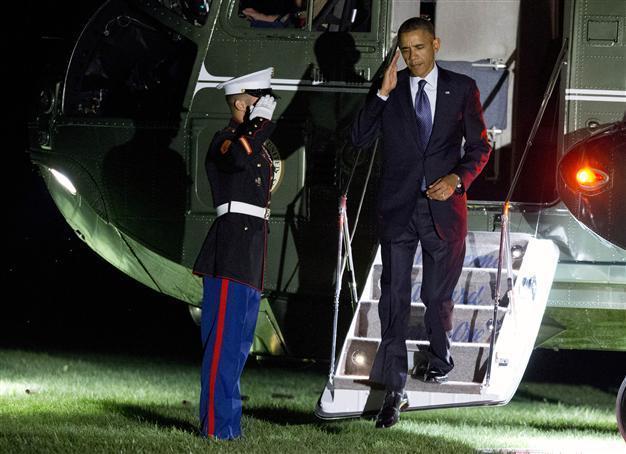Obama says US can't turn 'blind eye' to Syria
WASHINGTON - Agence France-Presse

U.S. President Barack Obama arrives on the South Lawn of the White House on Sept. 6, 2013 in Washington. AP photo
U.S. President Barack Obama on Sept. 7 warned lawmakers against turning "a blind eye" to Syria, as Washington sought to muster European Union support for military strikes against the Damascus regime.Fresh from a G20 summit in Saint Petersburg where Obama failed to win over world leaders to his cause, the president urged Congress to authorise an intervention over President Bashar al-Assad's alleged use of chemical weapons.
"We cannot turn a blind eye to images like the ones we've seen out of Syria," Obama said in his weekly address.
"That's why I call on members of Congress, from both parties, to come together and stand up for the kind of world we want to live in; the kind of world we want to leave our children and future generations." Congress reconvenes on Monday and Obama is set to address the nation on Tuesday Sept. 10 about a possible U.S. response to the August 21 attack that left hundreds dead on the outskirts of Damascus.
Faced with a war-weary U.S. public and little international support, Obama is bracing for an uphill battle to convince American lawmakers to back military action against al-Assad's regime.
According to a Washington Post survey, 224 of the current 433 House members were either "no" or "leaning no" on military action as of Friday. A large number, 184, were undecided, with just 25 backing a strike.
The Senate and the House are expected to vote on the issue within the next two weeks.
Amid deep global divisions over the Syria crisis - with al-Assad ally Russia strongly arguing against any intervention - U.S. Secretary of State John Kerry has travelled to Europe to bolster support for military action.
Kerry went into informal talks with the EU's 28 foreign ministers in Lithuania, which currently holds the EU's rotating chair, with the bloc itself sharply split on Syria and most nations highly reticent over military action.
In France, so far the sole EU nation determined to join a U.S.-led strike, the latest public opinion poll showed 68 percent of people opposed to military action in war-torn Syria, an increase of nine percentage points since late August.
In Vilnius, Kerry pressed the case for punitive action against Syria over last month's deadly gas attack, which the United States says was carried out by Assad's regime - a claim denied by Moscow.
A State Department official said Kerry expected "a fairly detailed discussion about our thinking" but noted "that there are divisions within the EU about what is the exact sequencing of the need for an international response." As talks between Kerry and his EU counterparts dragged well beyond schedule, also touching on the Middle East peace process, EU diplomats reported intense backroom negotiations taking place to seek a consensus on Syria.
France and Denmark are supportive of a U.S.-led strike but Germany, Sweden and others were refusing to endorse action without a U.N. mandate or a debate within a U.N. framework.
The talks take place after Obama and his Russian counterpart Vladimir Putin failed to bridge their differences at the G20 summit of top global powers.
Just over half of the G20 states signed up to a statement calling for a "strong" response to last month's alleged chemical attack, with Britain, France, Italy and Spain the only EU countries of the 11 nations that signed.
The statement called for a response that would "send a clear message that this kind of atrocity can never be repeated."
Later Sept. 7, Kerry is due to fly to Paris for talks with French officials. He will meet Arab League leaders there on Sept. 8 to update them on Syria and on progress in the Israeli-Palestinian peace process.
He will travel on to London for talks late Sept. 8 with Palestinian president Mahmud Abbas, before flying home Sept. 9.
















